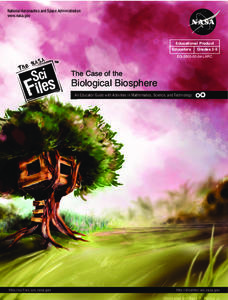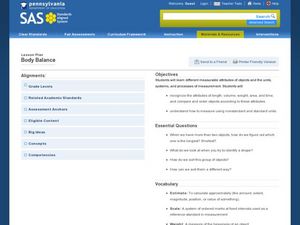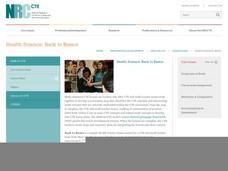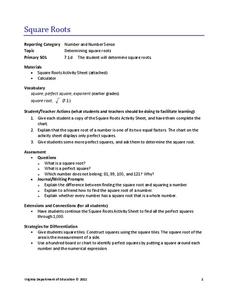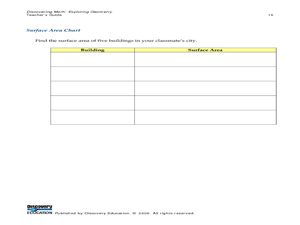Curated OER
The Case of the Biological Biosphere: Health, Math, Technology
Students investigate various aspects of the human body in this imaginative Tree House Detective episode about the biological biosphere. In a series of They take measurements, analyze data, and use technology. The lessons revolve around...
Curated OER
Math: Skyscraper Comparison
Students examine skyscrapers by conducting Internet research and by creating and interpreting graphs. After reading the book, "Skyscraper," they discuss reasons why the structures are built. Once they have researched the tallest...
Curated OER
Gummy Bear Math
First graders predict, collect data, and create a graph based on gummy bear colors they are given. In this graphing lesson plan, 1st graders first predict how many colors of gummy bears there are. They then count the colors, graph them,...
Curated OER
Lesson 9-3 Practice B: Composite Figures
In this composite figures worksheet, young scholars solve 11 short answer problems. Students find the area of figures composed of various polygons. Young scholars find the area of each figure given a sketch of the figure with various...
Curated OER
Water Pollution Lesson Plan: All Messed Up
Students map and calculate the area of the school parking lot and then the volume of water falling on the school parking lot. They map the route surface runoff will take to the nearest water body and describe the roles that human...
Curated OER
Dealing with Data in Elementary School
Students follow the scientific method in collecting data. In this following the scientific method in collecting data instructional activity, students develop a question they would like answered such as how many aluminum cans are consumed...
Curated OER
Measuring Pattern Block Angles
Sixth graders identify various angles by using pattern blocks. For this measurement lesson, 6th graders find out how many degrees are in each of the different angles of the various pattern blocks.
Curated OER
Measuring Pattern Block Angles
Sixth graders review the rotation of 180 and 360 degrees. Using the alphabet, they estimate the angle degree and identify the angles as either right, straight, obtuse or acute. In groups, they measure the pattern block angles and record...
Curated OER
Measuring to the Nearest Inch
Third graders use whole numbers and fractions to make connections between abstractions of the mathematical world and the real world. In this fractions and measurement lesson, 3rd graders identify, quantify groups , and measure distances....
Curated OER
Are you in Golden Shape
Students solve and verify the solution for unknown measures. In this geometry lesson, students identify the properties of circles. They use the arc, angle and segment relationship to find the missing measures.
Curated OER
Leaf Weight-Loss Plan
Learners measure the weight of a container of leaves daily to discover how quickly it grows lighter as the foliage dries.
Curated OER
Body Balance
Examine measurable characteristics of objects to build an understanding of the different ways you can discuss an object's size when comparing it to other objects. After whole group instruction, the class compares and organizes several...
National Research Center for Career and Technical Education
Health Science: Back to Basics
This lesson focuses on unit conversion, proportions, ratios, exponents, and the metric system. Discuss measurement with your math class and demonstrate how to solve several health-science word problems. Give learners a chance to visit an...
Curated OER
Rolling with Links
First graders explore geometry by completing a worksheet in class. In this non-standard measurement unit lesson, 1st graders discuss different techniques for measuring items without the use of a ruler. Students read several short stories...
Curated OER
Hands Around The World
Students engage in a lesson that is concerned with the concept of measurement. They conduct an experiment by measuring the amount of children needed to cover the distance of 50 yards. They calculate the distance around the world and how...
Curated OER
Cookie Creations
Students research ingredients typically found in cookies. They write recipes for creative cookies, using standard measurements and imaginative ingredients. Students illustrate the ingredients for their recipes and the baked product. They...
Virginia Department of Education
Square Roots
Square away any doubts about using a new resource. Pupils learn about squares and square roots in the mini-instructional activity. They complete a worksheet identifying roots of perfect squares up to 400.
Curated OER
Circles 1, 2, 3, 4
Here is a way to help your charges identify circles and spheres. In this shapes geometry and technology lesson, students identify and draw circles and explain the related attributes. They recognize circles and spheres while exploring...
California Academy of Science
Snakes and Lizards Length and Movement
Snakes and lizards can be very tiny or very long. Your class will get out their rulers to see just how big snakes and lizards can be. They discuss several different reptiles by reading the included animal fact cards, then each small...
EngageNY
The Definition of Sine, Cosine, and Tangent
Introduce your classes to a new world of mathematics. Pupils learn to call trigonometric ratios by their given names: sine, cosine, and tangent. They find ratios and use known ratios to discover missing sides of similar triangles.
EngageNY
Using Trigonometry to Determine Area
What do you do when you don't think you have enough information? You look for another way to do the problem! Pupils combine what they know about finding the area of a triangle and trigonometry to determine triangle area when they don't...
EngageNY
Secant Lines; Secant Lines That Meet Inside a Circle
Young mathematicians identify different cases of intersecting secant lines. They then investigate the case where secant lines meet inside a circle.
EngageNY
The Slope of a Non-Vertical Line
This activity introduces the idea of slope and defines it as a numerical measurement of the steepness of a line. Pupils then use the definition to compare lines, find positive and negative slopes, and notice their definition holds for...
Discovery Education
Discovering Math: Exploring Geometry
Apply geometric properties and formulae for surface area and volume by constructing a three-dimensional model of a city. Learners use similar and congruent figures and transformations to create a city of at least 10 buildings. They trade...


